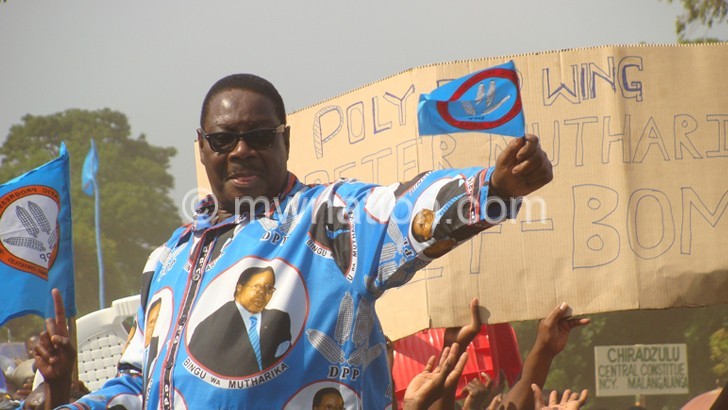EIU report tips APM to win
United Kingdom-based Economist Intelligence Unit (EIU) has tipped President Peter Mutharika and his Democratic Progressive Party (DPP) to narrowly win the 2019 elections despite facing an uphill task to ease economic hardships causing dissatisfaction among citizens.
The main opposition Malawi Congress Party (MCP) has since welcomed the EIU projections, saying they are an indication the country’s oldest political party is on its way to form government for the first time since losing the first post-independence multiparty elections in 1994. MCP argues that the findings are in its favour because the report assumes a DPP victory is only possible if MCP fails to resolve internal leadership wrangles.

The report, generated on January 14 2018, says Mutharika may win on the back of the popularity of his party in the populous Southern Region even if the electoral system was changed from the current first-past-the-post or simple majority to 50-plus-one.
Reads in part the report: “The government’s failure to reform this [electoral laws] will be a major campaigning platform for the opposition who will accuse the DPP of seeking to preserve the status quo from which it benefits.
“Amending the electoral process so that the presidential candidates have to win an absolute majority may happen, but even if it does, we still expect Mr Mutharika, who has announced his intentions to stand for re-election, to win.”
But the report observes that Mutharika’s growing isolation within the DPP might expose him to possible challenges to his authority from within the party.
Reacting to the report, political analyst Nandin Patel said both the prediction of a likely Mutharika victory and continued citizen dissatisfaction are not surprising outcomes as they reflect realities on the ground.
In an interview last evening, she said: “The proposition that no one party will secure a majority in the Legislature and the DPP could well win the presidency though with a small margin seems to be the likely scenario.
“[But] the EIU report seems to be somewhat confused on the proposal on electoral systems reforms. It was not proportional representation vs. the first-past-the-post, but it is the introduction of absolute majority [50+1] for the presidency replacing the current simple majority system.”
However, Patel said the report “makes a very pertinent observation on the public discontent with the establishment which is likely to remain high” and also right to foresee that mass protests will spark sporadic outbreaks of violence.
But MCP deputy spokesperson Ezekiel Ching’óma said rampant corruption and subsequent economic hardships stirring public dissatisfaction could likely influence an opposition victory in 2019.
He said: “It is clear in the report that DPP will win if the opposition is divided. If the condition for DPP to win is for economic transformation, ending corruption and continued infighting in the MCP, then DPP will win.”
Minister of Information and Communications Technology Nicholas Dausi, who is the official government spokesperson, yesterday welcomed the report, saying the DPP will likely win because it was also addressing its shortfalls.
The report has come after MCP won five of the six by-elections—three parliamentary and two ward councillors—in October 2017, a feat that gave the party momentum towards 2019.
In the run-up to the May 20 2014 Tripartite Elections, the EIU wrongly predicted a victory for then president Joyce Banda who was voted out after finishing a distant third in both presidential and parliamentary races.
EIU is a member of The Economist Group. n





